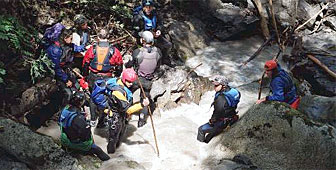Ogi opens memorial park to canyoning victims

The former minister for sport, Adolf Ogi, has opened a memorial park near the small town of Wilderswil in the Bernese Oberland to mark the second anniversary of the deaths of 21 people killed when a canyoning trip ended in disaster.
Ogi praised the families and friends of the victims for their courage in the face of the tragedy, but he warned that only time would lessen their grief. “Parents, children, brothers, sisters and friends will come to this place to find comfort,” he said.
The park, located near the Saxet gorge where the 18 tourists and their three guides were swept to their deaths by a flash flood, contains a stone bench in the shape of a boomerang in recognition of the 14 Australians who lost their lives.
According to the father of one the victims, the boomerang was an especially poignant choice since it also symbolised the idea of “return”.
A five-foot high block of stone hewn from the gorge and bearing the names of all 21 victims already stands on the site of the memorial park, which was financed by the Australian charity “Healing Hearts” and the local council.
Organisers face trial
The opening of the park comes four months before the Swiss authorities are due to put the organisers of the fateful trip on trial. Three board members of the now defunct Swiss firm Adventure World, which led the tour, and five others face charges of negligent manslaughter.
The eight are blamed for allowing the canyoning trip to go ahead even though a thunderstorm was brewing in the area.
The public trial is to take place in Interlaken, close to the scene of the tragedy where the Australians, two Britons, two South Africans, one New Zealander and two Swiss died.
Fatal bungee jump
Adventure World closed after an unrelated accident in May 2000 in which a 22-year-old American died during a bungee jumping trip because the rope the company’s guide used was too long.
The extreme sports industry has been hit hard since the Saxet gorge disaster suffering a 60 per cent drop in bookings, according to Thierry Gasser, of the firm Outdoor Activity, based in canton Valais.
The decrease is partly blamed on a general loss of appetite for extreme sports as well as on the negative publicity generated by a number of accidents.
Safety certificates
In the absence of legislation, efforts to regulate the extreme sports industry have so far been piecemeal, with canton Bern setting the standard. To date, three adventure companies have received safety certificates from the cantonal authorities, with a further dozen applications pending, according to project leader Eveline Lanz.
From September, the Swiss Tourism Federation is also trying to extend its “Safety in Adventures” certificate beyond the current realm of canyoning, rafting and bungee jumping to encompass other extreme sports.
However, while some like Thierry Gasser fear any legislation will find itself quickly outdated, Jean-Michel Cina, a parliamentarian from canton Valais, is convinced that a new law represents the only way forward.
“A certificate costs a lot of money and the firms which stump up the money will find themselves under pressure from their lower priced competitors,” he warned.
The cabinet is expected to make a statement on the issue before parliament reconvenes for its autumn session.
swissinfo with agencies

In compliance with the JTI standards
More: SWI swissinfo.ch certified by the Journalism Trust Initiative
You can find an overview of ongoing debates with our journalists here. Please join us!
If you want to start a conversation about a topic raised in this article or want to report factual errors, email us at english@swissinfo.ch.